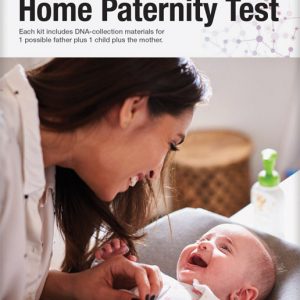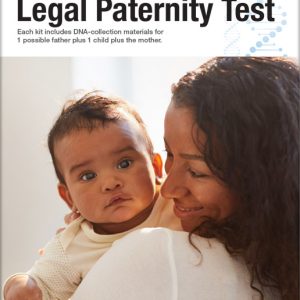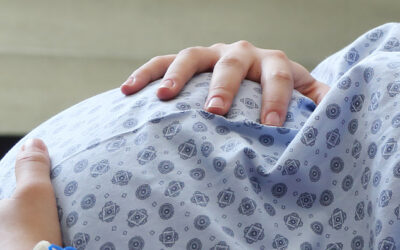
If you’re considering DNA paternity testing, what information do you expect to get? Today’s technology is so advanced that you’re sure to get an accurate and conclusive answer to your paternity question—especially if you test with a highly-accredited lab; but some people also think they’ll get specific details and characteristics about test participants. Is this true? What info do you get? Here are some quick answers.
What Paternity Testing CAN Tell You
Paternity testing tells you whether or not the man tested is considered the biological father of the child tested
Answering this question through DNA is why people do this test in the first place, and it’s by far the most reliable and cost-effective method to determine a biological relationship. Once the DNA profiles for participants are established, results are calculated using tried-and-true statistics. Test results will usually give a probability of paternity of 99.9% or higher when a man is considered the biological father of the child tested, and 0% if DNA data shows the man is not considered to be the biological father.
The sex of paternity testing participants
One of the DNA markers checked by the lab during paternity testing is the “Amelogenin,” or sex gene. On a report, this shows as XX for female, and XY for male. This is a useful process for a variety of reasons. For example, if the child is supposed to be male and this check shows that the child’s sample is from a female, the lab can contact the customer and ask for clarification to ensure correct samples were submitted. Sometimes customers accidentally mislabel samples, and this process can catch this mistake.
Who the father is while you’re still pregnant
It used to be that you could only determine paternity once the baby was born, but that’s no longer true. The technology for non-invasive prenatal paternity testing is so advanced now that you can reliably do paternity testing while pregnant (once the mother is 8 weeks or further along) without any risk to either mother or unborn child.
What Paternity Testing CAN’T Tell You
If an alleged father sent in someone else’s samples instead of his own
If you test with a trusted and highly-regarded lab, you can be absolutely sure results are accurate for the samples the lab is given. But there are some parts of the test that may be out of the lab’s control.
When doing at-home testing, the identities of participants are not verified by an impartial outside party, or witness. For this reason, peace-of-mind paternity testing won’t determine whether the sample submitted for the possible father really is his or if he submitted someone else’s. Similarly, a mother might submit DNA for her friend’s child instead of collecting a sample for her own child. The lab cannot police this type of fraud and has to assume in good faith that the samples submitted really do belong to who participants say they do.
When doing at-home testing, it’s best if all participants can collect their DNA in the same room, watch each other seal envelopes, and drop them off at the post office together. If this isn’t possible, it might be advisable to pay a little extra for a legal paternity test wherein all DNA collection and submission to the lab is supervised by an approved witness. An added benefit of this type of test is that results can be used in court.
The age of participants
Sometimes, if there are two alleged fathers in a case who share a father/son relationship, the assumption is made that paternity can be determined based on the fact that the father’s “DNA age” would be older than his son’s. The only way to determine someone’s age based on their DNA would be to compare a sample taken at birth with a current sample. And even that would be an educated guess.
A determination of paternity if alleged fathers are identical twins
Identical twins have identical DNA, and so it’s impossible to determine paternity through affordable paternity testing at this time. To find any differences between them, their entire genomes would have to be sequenced—that’s about six billion markers—which would be super-costly!
A probability of biological relationship other than father/child
Paternity testing is just that: testing for paternity between a possible father and a child. It does not determine whether the man tested is an uncle, brother, grandfather, cousin, etc. More comprehensive analysis is required for testing these types of biological relationships and it’s called family reconstruction testing.
LEARN MORE ABOUT FAMILY RECONSTRUCTION TESTING >
Final Thoughts about Paternity Testing
Analyzing DNA is still the most accurate and reliable method for paternity testing, which is why it’s trusted to settle family disputes every day by courts across America and around the world. But it’s important to remember that these tests are designed for one specific purpose and one purpose only: to establish the probability of a biological relationship. If you have other familial questions that could be answered by DNA, other types of tests are a better choice.






Hello!
I did a non invasive in the beginning of my 8 weeks with DDC. Is there a way that DDC can determine if i still didnt have enough of the babies dna in my blood in order to find matching dna in alleged father? I did get results but is there anyway that i just didnt have the babys cell in my dna yet? Would i have been told to retest or theres no way to distinguish my dna with babys in my blood?
Hi, Dm. If there hadn’t been enough fetal DNA in your bloodstream, we would not have issued test results and would have asked you to wait a few weeks before getting a blood redraw. With this test, we are able to distinguish your baby’s DNA from your own.
Therefore i shouldnt need to do another home paternity test ? There in fact was enough if I got a result ?
Hi I know this is kinda old, but was your test right?
Can you tell the age of a child by the dna?
No, ma’am. Just the sex.
Can you test for possible biological mother
Hi, Jessica. Yes. It’s called a maternity test and it works much the same way as a paternity test. You can learn more about it here: https://dnacenter.com/relationship-testing/maternity/
I included the mothers dna but only 13 loci, excluding the one for sex, were tested. My test came back with a CPI of 100% and a probability of paternity of 99.99%. Though why were only 13 non sex loci tested and not 15 or 17?
Hi, George. There is no such thing as a CPI of 100%. Did you test with DDC?
I meant the Combined Paternity Index or CPI was over 100. But only 13 Loci were tested not including the sex Loci. I did my test with Identigene a few years ago.
I apologize, I meant the Relationship Index is greater than 100. The Combined Parentage Index is 65,709,000 to 1 and a probability of Relationship of 99.99%. But only 13 loci were tested. Could this have something to do with the specific loci tested being unlikely to match if I was not the father? I thought most places check for 15 or more. Sorry for the confusion.
That is considered a conclusive result, George. You must have done your test more than a few years ago, because Identigene has been testing 15+ loci and the sex gene for at least 5 years.
Report date is listed 04/12/2016. There are 13 Genetic markers, and one sex marker. I dont doubt the results, but there are only 13. Would this make it less conclusive? Date of collection 04/03/2016 and date of accession 04/11/2016.
If you were given conclusive results, then the number of markers tested was enough.
The mothers DNA was also included.
Does paternal DNA testing Indicate if the child is biracial
Hi, Bob. No; a paternity test uses non-coding DNA for analysis, so none of the data measured is connected to physical appearance/race, etc.
Can DNA paternity test tell difference between human and animal DNA? For instance the alleged father swabs his dog instead of himself.. would results come back as negative or inconclusive? Test was also done 5yrs ago.. not sure how much they change within 5yrs.
Hi, Carly. A highly-respected accredited DNA lab like ours can tell the difference between human and animal DNA.
I am scheduled for paternity testing in April. I’m 51 the mother is 35. I dont think its mine. she does! With my age being what it is, Anyway DNA could test different?
Hi, Michael. Your age doesn’t matter at all.
Hearing alot about Mutations in older adults can be difficult to determine. Any truth to that?
Hi, MG. A mutation for paternity testing is not difficult to determine at any age.
Would a woman be able to use her DNA on the paternity swabs to make it come out positive for that sample?
Hi, Spencer. No, because the sex of the participant is determined during testing. So if a swab is supposed to contain a male’s sample, but contains a female’s instead, we’ll suspend testing and reach out to the customer.
Can you test sperm with saliva swab? Is there a expiration on time sperm & swabs are submitted?
Hello, Aprille. Using a sample other than cheek cells for paternity testing involves additional viability fees and costs substantially more than using cheek swabs the way they are designed. Contact us for more info at 800-929-0847.
I took a dna test in 2004 it was a 13 marker codis parternity test.on 3 marker me the child and mother had the excact the same dna.how is that.it ended up 4 markers were wrong.the test come out 99.99 how is that ?.nobody can answer that. why.
Hi, Ed. Without looking at the report, it’s impossible to give an answer. Sorry!
can ypu test for race of baby with just mothers dna
Hi, Kaity. Race cannot be determined through DNA testing.
I took 2 DNA test to find my daughters father and on the other Dna test results some numbers where added and those numbers did not match the first dna test. If my daughters DNA was already on file why would 2 numbers be added ? Also the 2nd dna test had 11 Pi matches but it says he wasnt the father ….. why is that ? Both results came back not the father but those men where the only guys i had sex with !
Hello, Ana. Without having the data for both tests to compare, it would be irresponsible of me to try to answer your questions since my reply would be based on speculation and I don’t have all the needed information. You may be misinterpreting data too. You should ask these questions of the lab(s) where you tested.